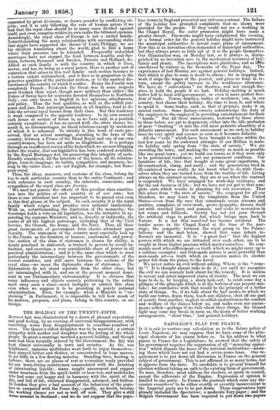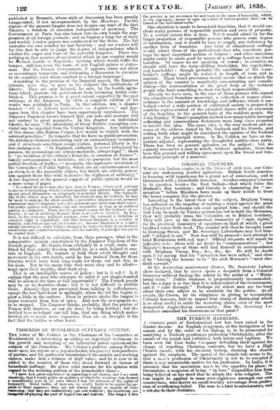NAPOLEON'S PLAN FOR FRANCE.
IF it is safe to venture any calculation as to the future policy of Louis Napoleon, we may suppose that we have some of the prin- cipal elements of his course before us. In his address to what passes in France for a Legislature, he avowed that the safety of his government requires the suppression of all "annoying opposi- tion." which dispute the bases of the national institutions—mean- ing those which have not yet had a seven-years lease. One re- quirement is to put down all discussion in France on the general subject of government. This is not affirmed in so many terms, but it appears from the facts. No candidate is to present himself for election without taking an oath to the existing form of government. No man, therefore, must address the electors, or speak in council, except the adherents of the Empire. Expression of opinion is limited to one party. In France the journals which raise any dis- cussion considered to be either overtly or covertly inconvenient to the Imperial party are to be put down. These suppressions have already included the Spectateur, a moderate Tory paper • and the Belgian Government has been required to put down two papers published in Brussels, whose style of discussion has been greatly exaggerated, if not misrepresented, by the -ifoniteur. Forthe regime of the presentEmpire does not despise.one trait of the first Empire, a freedom of assertion independent of accuracy. The Government at Paris has also taken into its own hands the sup- maiden of all foreign journals ; and on Sunday a long list of daily and weekly London papers was confiscated by the State. The list includes our own number for last Saturday ; and our readers will by this fact be able to judge the degree of independence which excites the anger and fears of the powerful Emperor. There was nothing in that number of our journal which in our country would be iftemed lhostile to Napoleon ; nothing which would raffle the temper' .still less rouse the fears, of any English prime or states- man. But the French Government, it appears, dares not allow so exceedingly temperate and forbearing a discussion to circulate in the country, even when couched in a foreign language According to the promise of the Imperial speech, the Emperor intends, some day, to give to his subjects the institutions of liberty. They are only delayed, he says, by the hostile agita- tions which prevent his government from becoming firmly esta- blished. This promise is to a great extent supported by the past writings of the Emperor. In 1854, a complete edition of his weeks was published in Paris. In that edition, was a chapter headed •• De la Liberte indiriduelle en Anyleterre," and pea- sages from this chapter have been opportunely reproduced. The Emperor Napoleon knows himself that our laws and customs will nut ceuesey to great monarchs. In his chapter on individual liberty, he says, "No inhabitant of Great Britain (excepting eon- viees).oan. be expelled from the United Kingdom. Any infraction " of this clause (the Habeas Corpus Act) would be visited with the severest:penalties." He remarks that we have no public prosecutor, theAttorney-Generalinterfering only on extraordinary occasions; and if criminals sometimes escape justice, personal liberty is the leas endangered. "In England, authority is never influeneed by passion, its proceedings are always moderate, always legal " ; there is "no violation of the citizen's domicile, so common in France "; family correspondence is inviolate, and no passports bar the most petifeetfreedom of traffic,—" passports, theoppressive invention of the Committee of Public Safety, which are an embarrassment and an obstacle to the peaceable citizen, but which are utterly power- less against those who wish to deceive the vigilance of authority." A)law deprived of the general support of public opinion would. be a mere scrap of paper. "It suffices form to note this fact, that in Franc*, where such jealousy is,shown.of everything which touches equality and national honour, people de. not attach themselves so religiously to personal liberty. The tranquil- lity of the citizen may be disturbed, his domicile may be violated, he may be made to undergo for whole months a preventive imprisonment, personal glarantem maybe despised, and a few generous men shall raise their voices ; but public opinion will remain calm and impassible as long as no political passaou is. awakened. There lies the greatest reason for the violence of au- thority ; it can be arbitrary bemuse there is no curb to check it. In Eng- land, on the.contrary, political passions cease the moment a violation of common right is committed ; and this because England is a country of
legality, and France has not yet become so ; bemuse England is a country solidly constituted, while France struggles by rams for forty years between revolutions and counter-revolutions, and the sanctity of principle has yet to be created there."
It is not difficult to calculate, from these passages, what is the comparative opinion entertained by the Emperor _Napoleon of the
French people. He thinks them evidently in a crude state, un- fitted for that orderly freedom which he,, as a unit, helped to sus- tain in England. He intends to held their every thought and movement in his own hands, until be has trained them for those liberties which have been long ready for them, cut and dry, in his desk. But in the mean time they must obey and be silent— mast open their mouths, shut their eyes. This is an intelligible course of policy ; but is it safe ? Is it. certain that the man who attempts to carry it out single-handed will be allowed the time or full opportunity ? The French people may be as he describes them ; but it is not difficult to irritate them. Already they are prevented from talking in coffeehouses, except the last half-hour at midnight, when the old fire begins to glow a little in the embers. Even in private circles the tongue is under restraint from fear of spies. And now the newspapers are to be stopped. The Emperor thinks, probably, that the genius of France will improve, as our ale does, by being bottled; but the bottled beer merchant can tell him, that one thing which makes bottled ale so much more expensive than ale on draught is the fact that the bottles so often burst.



























 Previous page
Previous page